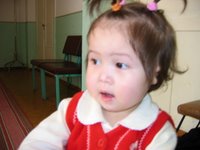A face in the dark

One day, I picked Maia up after preschool. She was then a little over three. I had stayed home because I was a little sick and also because I wanted to do some more work on a home improvement project. Mainly I just didn't want to go to work.
I like taking Maia out to do things because it's fun to show her how things work.
That day I decided to take her to the car wash after school. Kristina's car was dirty, and I figured that riding in the car through the car wash tunnel would be fun for Maia.
There was a line of cars waiting to go through the tunnel. Maia was in her car seat in the back and was being very quiet. In the rear view mirror, I could see that she was playing with the little nub of her left ear lobe.
"What's wrong, Maia?" I asked.
"I lost my ear," she said.
Maia is missing almost all of her left outer ear. There is no ear canal, just a smooth spot on the side of her face where the ear canal should be.
Birth defects are a legacy of the Soviet occupation of Kazakhstan--the Soviets used it as an industrial dump and nuclear testing ground.
"Does that make you feel sad?" I asked her.
"Yes," she said.
"It makes me feel sad, too," I said.
Kristina and I had used the internet to look for medical resources for addressing the problem and had discovered a clinic in California that specializes in the repair of problems like Maia's. But a child has to be 5 before the work can be started. Any younger and the prosthetic ear is too large or would be outgrown.
"We will try to do something about it, sweetness, but we will have to wait for a year or two till you get older."
She was still staring off into space.
"Is there anything you want to ask me about it?"
"No," she said.
I know that the ear weighs on her and that we need to talk with her about it.
The ear is all wrapped up in the adoption so that makes it harder. Parents in Kazakhstan must give written explanations to the State of why they have abandoned children. Maia's ear was the reason that was cited by her natural parents. They never took her home. She spent her first two months in a hospital. After that, she was in the "Baby House" in Shymkent until we took her home. She didn't leave it except for two visits to the hospital for a respiratory infection.
We've talked to Maia about Kazakhstan, used the word, "adoption," and shown her pictures of the orphanage. But I don't think any of it has sunk in yet. A birth defect, being abandoned and the linkage between the two is a lot to ask a little girl to absorb.
The next night it fell to me to get Maia to bed.
We read some books, and then she was ready to sleep.
"Eye down with me, Daddy," she asked. She can't say els yet, so that's the way "lie down" comes out.
I turned out the light and lay down next to her.
"I can't see your face," she said.
"Your eyes will grow used to the dark, sweetness. Then you'll see it."
I felt her fingers on my face.
Kristina turned on a light in a room down the hall, and some of the light filtered in.
Maia looked at me and smiled.
***
This picture was taken on May 1, 2004. This was the third time we saw Maia. I took this picture as part of a series that I emailed to a doctor in Seattle, Washington for his opinion of the ear. The series is the worst set of pictures I've ever taken of her. Maia was then a little less than 21 months old.
John, March 28, 2006

0 Comments:
Post a Comment
<< Home